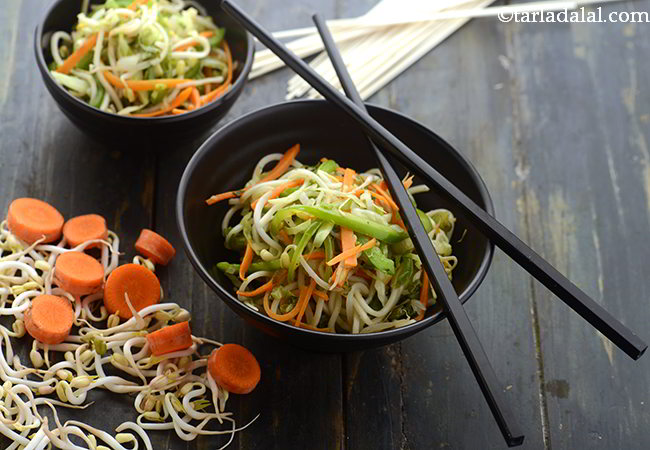See recipe Boiled Hakka Noodles | how to boil noodles | how to boil hakka noodles | with 5 amazing images.
No Chinese meal is ever complete without Boiled Noodles (hakka noodles), which is used not just for the main course but also to prepare a range of other dishes ranging from soups and starters to desserts too!
This means that before you foray into Chinese cuisine, you ought to know how to cook noodles (how to boil hakka noodles) perfectly – and this simple recipe will make sure you succeed in your venture.
Notes on how to boil noodles | how to boil hakka noodles. 1. To make Boiled Hakka Noodles, first boil enough water in a deep pan. Add salt to taste and oil. 2. Boil the hakka noodles for 8 to 10 minutes or till they are 70-80% cooked. Do not overcook or else they will turn soggy. Drain them using a strainer. 3. Refresh Boiled Hakka Noodles under cold water so they do not stick to each other and the internal cooking process stops. 4. Keep aside Boiled Hakka Noodles to cool. You can also drizzle oil to avoid noodles from sticking to each other.
We use boiled hakka noodles to make the famous Chinese hakka noodles and garlic noodles.
Is Boiled Hakka Noodles healthy?
Yes, this is healthy. But restrictions apply to some.
Let's understand the Ingredients.
What's good.
Whole Wheat flour : Whole wheat flour is excellent for diabetics as they will not shoot up your blood sugar levels as they are a low GI food. Whole wheat flour is rich in Phosphorus which is a major mineral which works closely with calcium to build our bones. Vitamin B9 helps your body to produce and maintain new cells, especially increase red blood cells. See detailed 11 benefits of whole wheat flour and why it's good for you.
What's the problem?
Vegetable Oils : To some vegetable oil is only soyabean oil, while some promote it as a mix of oils like soyabean, canola, sunflower, corn and other omega-6 rich oils. These are often cheaper options than many oils, but they are highly processed oils. They are undoubtedly not to be reached out for, whether you are looking for salad dressings, sautéing or cooking. The 5 best oils used in cooking are olive oil (low temperature short time cooking), avocado oil, canola oil, coconut oil and peanut oil. You must read the super article to find the facts of which oil is the healthiest avoid vegetable oil.
Note : 1 cup = 200 ml (standard cup available in the market). The weight in grams varies for each ingredient.
Can diabetics, heart patients and overweight individuals have Boiled Hakka Noodles?
Yes, this recipe is good for diabetics, heart and weight loss. Noodles are made from whole wheat flour which is excellent for diabetics as they will not shoot up your blood sugar levels as they are a low GI food. Whole wheat flour is rich in Phosphorus which is a major mineral which works closely with calcium to build our bones.
Can healthy individuals have Boiled Hakka Noodles?
Yes. This is healthy Noodles.
Which are healthy noodle options?
We suggest you have whole wheat vegetable noodles.

Whole Wheat Vegetable Noodles, Hakka Noodles for Diabetics
One cup of Boiled Hakka Noodles is high in
Protein : Protein is required for the managing the wear and tear of all cells of the body.
Note : a recipe is deemed high in a Vitamin or mineral if it meets 20% and above the recommended daily allowance based on a 2,000 calorie diet.
How to burn 403 calories that come from one cup of Boiled Hakka Noodles?
Walking (6 kmph) = 1 hour 1 mins
Running (11 kmph) = 40 mins
Cycling (30 kmph) = 54 mins
Swimming (2 kmph) = 1 hour 9 mins
Note: These values are approximate and calorie burning differs in each individual.